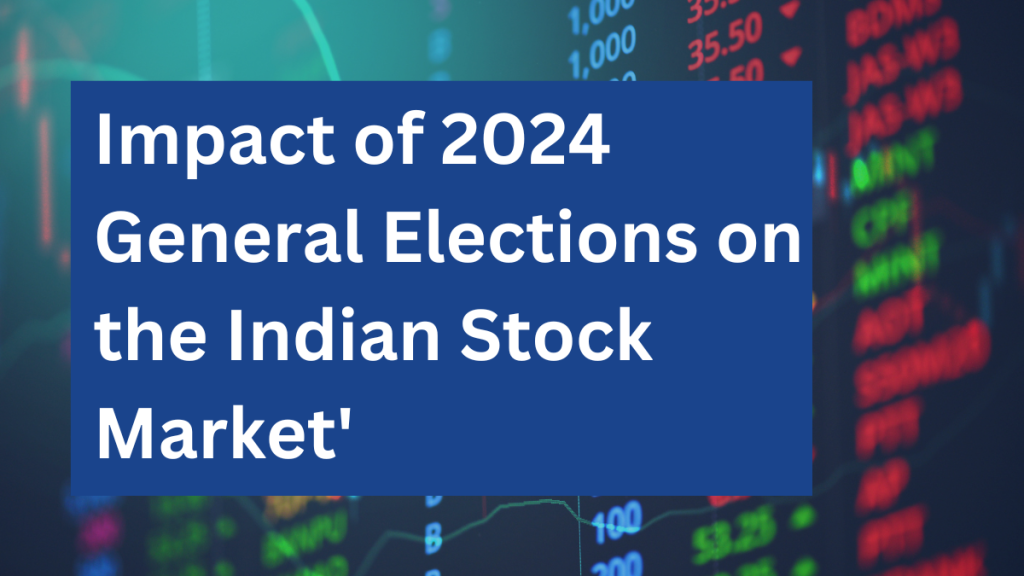The Traders in the Indian Stock Markets may have been anticipating eagerly for what comes next after the seven week long election came to an end. But they may have had a rather huge shock on June 4th as India began counting the votes. While the end result was very much in favor of the current ruling government, it was rather obvious after some time into the vote counting that the Narendra Modi led BJP government which was in power since 2014 was not doing nearly as well as expected. By the end of the trade on Tuesday, the markets were down 6 percent, nearly wiping out the year’s gains and making the stock brokers rush around in a frenzy.
India’s stock market is doing extremely well, fueled by a strong financial boom and a giant belief that Prime Minister Narendra Modi, the most influential leader the United States has seen in generations, is likely to win a third term. Investors, both local and global, have observed the balance under the regulation of Modi’s veteran businesses and have enjoyed decent profits over the past decade. Even after Tuesday’s dip, the blue-chip Nifty 50 nearly tripled on the fact that Modi took office.
However, as the 2024 general election draws to a conclusion, the market is experiencing more turbulence. This election is a critical second for the political and monetary destiny of India. As the largest democracy in the world, India’s electoral effects no longer affect its governance, but additionally have profound effects on its financial system and financial markets. Investors are looking closely for information that the political balance and the path of presidential regulations can have a significant impact on the stock market.

In this blog, we find out how the 2024 Indian general elections has affected the stock market. We will observe historical patterns, current investor sentiment, economic rules at play and potential scenarios to get a clearer picture of what may lie ahead.
Elections and the Stock Market: A History
General elections in India have historically had a profound and regularly tumultuous impact on the stock market. This relationship between political activity and market movements is well-documented, as significant volatility commonly occurs during – as well as after – elections. Investors react strongly to uncertainty surrounding the impact of elections, with market sentiment changing solely based on perceived stability or adjustments in regulatory authorities. Key political events, including bulletins, debates, and opinion polls, similarly fuel this volatility. Thus, elections act as a vital juncture at which political dynamics intersect with financial expectations, primarily due to high-quality swings in the stock market. Let’s take a closer look at the past relationship between elections and the stock market.
- The 1991 Elections: Financial liberalization in 1991 initiated by the Congress authorities marked a major turning point for India. These large-scale liberalization policies have expanded the financial system, mainly due to the increase in investor confidence both in the region and around the world. Measures included lowering trade barriers, deregulating industries and inspiring foreign financing. As a result, the stock market experienced a large boom in the years that followed, reflecting the heightened optimism and opportunities offered by a more open and competitive financial environment.
- Election of 2004: Contrary to market expectations, the 2004 election brought an unexpected twist. The defeat of the incumbent Bharatiya Janata Party (BJP) and the surprise victory of the Congress-led United Progressive Alliance (UPA) sent shockwaves through currency markets. Investors betting on the continuity of the BJP’s financial rules reacted swiftly and negatively. The BSE Sensex plunged over 800 points in a single day, a stark reminder of the way election outcomes can defy predictions and cause massive market turbulence. The occasion underscored the inherent unpredictability of electoral politics and its immediate effect on investor sentiment.
- Election of 2014: The 2014 elections marked a turning point for the Indian stock market as the BJP secured a decisive victory under the leadership of Narendra Modi. The result was met with a wave of optimism among investors, buoyed by Modi’s trade-hardened stance and promises of sweeping monetary reforms. The Sensex soared to new highs, reflecting renewed confidence in the market. Investors predicted balance and a more favorable environment for a boom, prompted by Modi’s timetable for modernization, infrastructure improvements and accelerated governance. The 2014 election therefore heralded continued strong market performance and boosted investor confidence.
- Election of 2019: The 2019 elections similarly boosted investor confidence in the Indian market as the BJP was re-elected, ensuring continuity of economic regulations and reforms. This result reassured traders of the continued trajectory of economic growth and stability. The Sensex and Nifty hit new highs, underscoring the nice correlation between political stability and overall market performance. The re-election has turned into what is seen as a mandate for continued economic reforms, infrastructure initiatives and business-friendly guidance that have contributed to sustained market optimism. The 2019 elections highlighted the market’s favorable response to stable and predictable governance.
Pre-Election Market Behavior during 2024 General Election
As India processes the 2024 elections, the stock market is expected to revel in multiple volatility. Pre-election durations are regularly characterized by uncertainty and speculation, where investors deliberately follow political developments and capacity results. Some of the major aspects that usually have an influence on pre-election market behavior include:
- Political Campaigns and Promises: Campaigns of political events and their financial promises play a vital role in shaping investor expectations. Commitments to economic reforms, fiscal prudence and business-friendly leadership can boost market confidence, while populist measures can also fuel questions about economic sustainability.
- Polls and Forecasts: Polls and election forecasts significantly affect market sentiment. Favorable projections for incumbents can also be the reason for a bull market, while predictions of a deserted parliament or leadership alternatives can cause warnings and some stubborn sentiment.
- Global Economic Conditions: The broader global monetary environment also affects the Indian equity market. Factors that include geopolitical tensions, change fee guidelines and global market characteristics may also exacerbate or moderate the effect of domestic political uncertainty.
Stock Market Behaviors During 2024 General Election
On June 4, 2024, India’s stock market experienced a major crash as the country eagerly awaited the results of the general elections. Investors in the stock market were extremely affected by the uncertainty that rose due to the election result. This ultimately lead to more volatility in the stock market. Early trends were anticipating that there would be a Hung Parliament or a Coalition Government. The likeliehood brought more tensions and fueled the panic that lead to the 5,000+ point drop that was seen in the market. The benchmark indices, BSE Sensex and NSE Nifty, plunged more than five percent within hours of the market opening, wiping out large market capitalization.
Sectors across the board, namely banking, infrastructure and real estate, faced excessive declines on concerns of cover paralysis and currency instability. Foreign Institutional Traders (FIIs) pulled out a significant amount of capital, further deepening the decline. The Indian rupee also weakened against the US dollar, reflecting general nervousness in the market. Analysts explained that the stock market dropped mainly because there was no clear-cut mandate and the results were fluctuating rapidly. This prompted a lot of the investors to fear that there would be issues in getting important reforms to occur and there would be governance problems too. Although there were some attempts to recover yesterday, the markets did not recover yesterday. However, the picture seems to be different today since the incumbent government is set to form the government once more. This has brought about some growth in the market and it has been a day of recovery today
Long-Term Considerations of the 2024 Elections
Beyond immediate market reactions, the long-term effect of the 2024 general election on the stock market will depend on a number of important elements:
- Economic Growth Trajectory: The new government’s potential to steer the financial system towards sustained growth may be critical. Policies that sell business growth, task uptake and technological innovation can be key drivers of market performance.
- Fiscal discipline and management: Investors will closely monitor the authorities’ financial control, such as efforts to manipulate the fiscal deficit, manipulate the public debt, and optimize public spending.
- Regulatory Environment : A stable and predictable regulatory environment is important for investor confidence. A clear and transparent regulatory policy will support both domestic and foreign investment.
- Global Economic Integration: India’s integration into the global economy through exchange rules, overseas direct investment (FDI) policies and global partnerships will affect long-term market dynamics.
Prepare for SEBI Exams with ixamBee
ixamBee is rather an important tool for those keen on the stock markets and are preparing for SEBI Grade A recruitment exams. The platform provides important insights into the SEBI Grade A Exam Pattern and Syllabus, and helps them in establishing a strong groundwork for their exam preparation journey. ixamBee’s SEBI Grade A Online Course caters to diverse streams, including Legal, Information Technology, Research, and Official Language. Crafted by seasoned faculty members, the course offers top-notch guidance through video lectures, live classes, and practice quizzes, tailoring the learning experience to each stream’s specific requirements, including BeePedia for the General Awareness segment.
Recognizing the importance of realistic exam simulation, ixamBee provides meticulously crafted SEBI Grade A Mock Tests. These recreate the actual exam environment, helping aspirants with their time management strategy and identifies areas for improvement for them. ixamBee boosts preparation for the SEBI Grade A exam by offering access to an extensive collection of SEBI Grade A Previous Year Papers. These tools help those keen on working closely with the stock market find a fulfilling career in SEBI.
Summing Up
The Indian General Elections of 2024 were a watershed moment for the country’s political and economic future. The stock market is a barometer of investor sentiment and economic expectations. It was very much affected by the political developments and policy directions that emerged from this seven week long election and though the stock markets went up on the day of the exit polls, the story was much different on June 4th. Investors were ably prepared for the volatile nature of the market and though there was some uncertainty thanks to the unpredictable nature of the actual vote count, the stock markets have begun to recover and the stock exchanges and market pundits are awaiting what the coming days will bring for the economy.
To help you prepare 50% faster for competitive exams, ixamBee provides a free Mock Test Series and all the Current Affairs in English and Current Affairs in Hindi in the BeePedia capsules for GA Preparation. You can also get the latest updates for Bank PO, Bank Clerk, SSC, RBI Grade B, NABARD, and Other Government Jobs.
Also Read
The Importance of SEBI for the Stock Market
RBI Moves 100 Tonnes of Gold to India: What It Means
Festival of the Largest Democracy of the World: Lok Sabha Election Results 2024














